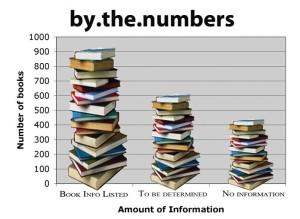
DATA COMPILED BY UPASANA KAKU/GRAPHIC BY CHRIS BIEN
A majority of courses listed by the Office of the Registrar do not include the textbook details federal law mandates be provided for students.
More than six months after a law mandated universities to provide textbook information for all courses in their registration catalogs, the majority of Georgetown class listings do not include the obligatory details.
The Higher Education Opportunity Act, passed in 2008 and implemented on July 1 2010, was pitched as a way to make college textbooks more affordable for students by allowing them to spend more time on the hunt for cheaper copies.
But of Georgetown’s roughly 1,944 classes, about 48 percent had textbook information listed in the registration catalog on Wednesday, the first day of classes, even less than the about 52 percent listing information in September. About 31 percent designated books “to be determined,” leaving students in the dark on book lists. The remainder of classes came up with a screen declaring that the class itself could not be found on the website. The majority of these remaining classes were independent study, research or graduate level courses.
University Registrar John Pierce said that the lack of book listings resulted from faculty members failing to notify the bookstore of their course reading material. Starting this year, professors gave their book lists to the Registrar’s Office, which then gave the lists to the bookstore and made them available to students.
However, this term the university required professors to notify the bookstore directly — even if they did not want the bookstore to order the books — so that the information could be made available to students directly. But Pierce said that many who opt out of ordering books through the school never end up reporting this information.
“It seems to me to be an efficient and effective system to have in place. It’s just a matter of educating people of the need to notify the bookstore,” Pierce said.
Even still, as rising textbook prices continue to draw student complaints, the university is trying out other methods to lessen the burden.
James Kuhlman, general manager of the main campus bookstore, said that the bookstore’s rental program, which debuted in the fall, was part of an effort to drive down costs for students. The program is run by Follett Higher Education Group, which manages the bookstore.
Last semester, 2,779 students rented a total of 8,685 books. By contrast, the bookstore sold about 47,000 textbooks.
Typically, renting saves students about 50 percent of the cost of a new book, though not all books are available for renting.
Christian Fagel (COL ’12) said he usually buys his books from the Georgetown bookstore, but he has not yet rented a textbook.
“They didn’t give me that option,” he said. But Kuhlman said that the rental program is gaining ground.
“As with any launch, we’ve had minor hiccups,” he wrote in an email. “But we’re looking to build upon what is already the nation’s largest bookstore rental program in the marketplace.”
Buying used textbooks is another popular alternative. History professor Adam Rothman said he has noticed growing numbers of students coming to class with used copies of texts. The Georgetown bookstore, as a part of its used book program, bought back books from more than 2,220 students last semester.
“Textbooks are ridiculously expensive these days,” Rothman said. “It makes sense.”
For textbook authors like Rothman, who has penned one textbook and collaborated on two others, the growth of rental programs and used book sales means losing money.
“But I don’t think that most of us write textbooks to make money off of them,” Rothman said.
Like many of his students, Rothman is no fan of using textbooks in the first place.
“Textbooks are kind of a necessary evil,” he said.
Correction: The article mistakenly reported that in previous years, professors gave their book lists to the Registrar’s Office, when in fact the process only began this year.







